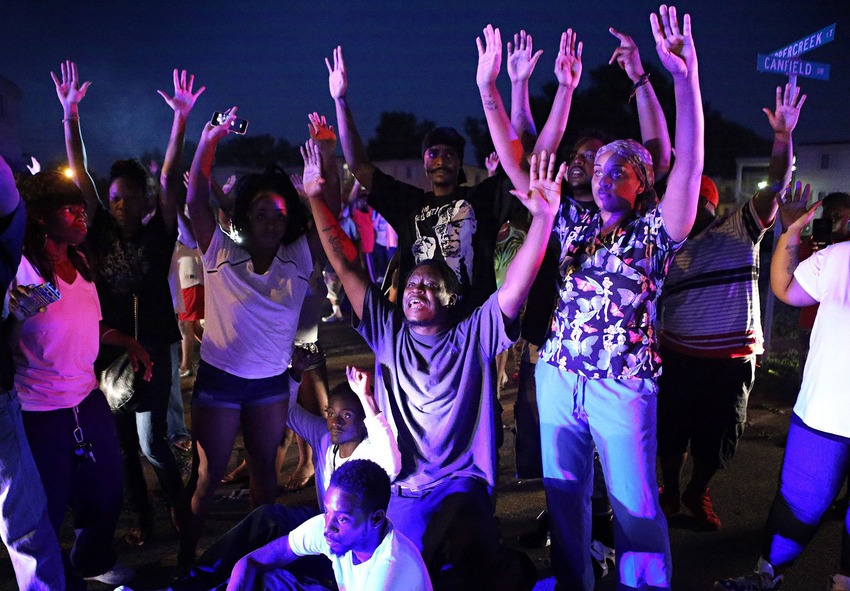This is a guest post by Jason Gaboury. He is the Regional Director of New York/New Jersey with InterVarsity. He directs and oversees the work of InterVarsity Christian Fellowship to undergraduates in that massive area!
Our nation is reeling again. When a grand jury failed to indict officer Wilson of any charge in the shooting death of Michael Brown, frustration and anger exploded in the street. Screens of smart phones lit up with tweets, articles, and commentary. Comments fly. Frustration escalates. There are outbreaks of violence and riots. Policing, particularly the militarized form used to ‘control’ the crowd is scrutinized. Pain is in the air.
How should Christians respond?
Moments like this call for prophets. Those with prophetic gifts often see spiritual dynamics that others don’t. In a moment of pain and conflict there is heightened awareness of problems many don’t see in their day-to-day experience. Prophetically gifted women and men help others see and understand the spiritual dynamics and implications behind the crisis. (Read through the Major Prophets like Jeremiah or Isaiah and you can see this dynamic play out against the social backdrop of ancient Israelite society.)
Often the prophetic gifts are awkward and uncomfortable. Experiencing a tragedy is difficult enough. Being told that the tragedy points to a spiritual, cultural, or structural dynamic of sin within our culture is harder. It’s tempting to dismiss the call.
I have friends who are gifted prophetically. They quickly answer the call of moments like these. They are articulate about the specific events happening on the ground and the larger social and spiritual dynamics these represent. I’m grateful for them, even when I cringe at the sharp edge of something they’ve said or written. These friends are offering their gift to the church and culture. They need our prayers.
But, not all Christians are gifted prophetically?
As an evangelist I wrestle with what to say in moments like these. The pressure to communicate can be very strong. Say nothing and you face criticism for being silent. Say something and it’s likely you’ll say the wrong thing or open yourself up to criticism. For someone who feels called to represent the gospel in word and deed this pressure can be debilitating.
The gift the evangelist brings is different from the prophetic gift. Where the prophet wants to interpret events and challenge structures in light of God’s truth, the evangelist wants to announce the good news of the gospel. The prophet and the evangelist are both messengers. Both interpret the times. But the point of emphasis for the prophet is justice, whereas the point of emphasis for the evangelist is good news.
This does not imply for a moment that the good news is about something spiritual rather than social. The message of the gospel is socially relevant. Jesus spoke, taught, and demonstrated a new way to be human. The gospel writers call this, ‘the kingdom of God’. Life in the kingdom of God is good news to those who are mourning, poor, persecuted, and longing for justice. Jesus’ followers are called to create communities where people can experience justice, reconciliation, healing, and freedom. But, the only way we can create these kinds of communities is when we ourselves are transformed by Jesus’ death and resurrection. The kingdom of God is impossible without the cross of Jesus Christ, just as the cross of Jesus is unintelligible without the vision of the kingdom.
So what does an evangelist do in a moment like this?
- Listen first. Our credibility to communicate the liberating and humanizing message of the gospel is tied to our ability to listen deeply and well to others. Others can interpret the events of these days according to their gifts and understanding, our job is to listen attentively.
- Refuse to demonize. It’s so easy to demonize others in moments like this. Instead of seeing the problems as endemic to the human race and ourselves as part of the problem we can externalize responsibility and blame. Every time evangelists do this we lose credibility.
- Insist on the gospel as a frame. Our culture polarizes in moments like this. The shrill voices shout slogans at one another across a chasm. If we are not vigilant we will allow the gospel to be subverted by a viewpoint on one pole or another thereby distorting the good news and robbing its power. As evangelists we are to insist on the gospel, (kingdom of God and Cross of Christ) as the interpretive lens.
- Share the good news. The good news is that God himself has entered our humanity. Jesus experienced police brutality, racial discrimination, and every type of evil. Jesus’ words from torture were not cries of condemnation, but a plea for mercy. Jesus built communities where everyone was welcome and all were called to holiness. Jesus demonstrated a way to be fully human and fully humane. Jesus’ resurrection demonstrates his vindication as Israel’s messiah and lord of the world. Jesus’ life is available to all who want it. We are called to follow Him and demonstrate his life to and for the world.


